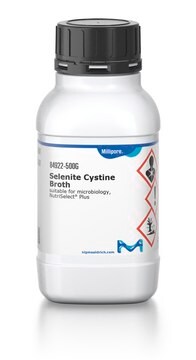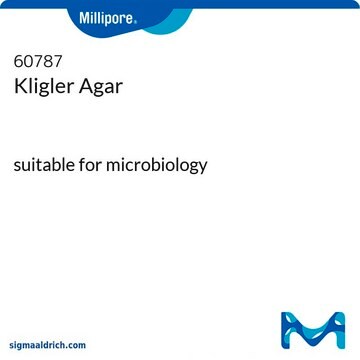85463
Simmons Citrate Agar
NutriSelect® Basic, suitable for microbiology
Synonyme(s) :
Citrate Utilization Test
About This Item
Produits recommandés
Stérilité
non-sterile
Niveau de qualité
Gamme de produits
BioChemika
Forme
powder
Durée de conservation
limited shelf life, expiry date on the label
Composition
agar, 15 g/L
ammonium dihydrogen phosphate, 0.2 g/L
bromothymol blue, 0.08 g/L
disodium ammonium phosphate, 0.8 g/L
magnesium sulfate heptahydrate, 0.2 g/L
sodium chloride, 5 g/L
trisodium citrate, 2 g/L
Fabricant/nom de marque
NutriSelect® Basic
Technique(s)
microbe id | utilization test: suitable
microbiological culture: suitable
pH final
~7.0
Application(s)
agriculture
clinical testing
environmental
food and beverages
water monitoring
microbiology
Adéquation
nonselective and differential for Escherichia coli
nonselective and differential for Salmonella spp.
nonselective and differential for coliforms
nonselective and differential for molds (General Media)
nonselective and differential for yeasts (General Media)
Description générale
Application
Notes préparatoires
Autres remarques
Note de bas de page
The designations basic, plus, or prime are added to indicate the quality control level, from basic quality control to standard QC plus to prime for full regulatory compliance.
Informations légales
Code de la classe de stockage
11 - Combustible Solids
Classe de danger pour l'eau (WGK)
WGK 2
Point d'éclair (°F)
Not applicable
Point d'éclair (°C)
Not applicable
Équipement de protection individuelle
Eyeshields, Gloves, type N95 (US)
Faites votre choix parmi les versions les plus récentes :
Déjà en possession de ce produit ?
Retrouvez la documentation relative aux produits que vous avez récemment achetés dans la Bibliothèque de documents.
Les clients ont également consulté
water
Articles
Salmonella, with 2,300+ serotypes, causes half of food-borne illnesses, often from dairy, poultry, and eggs.
Salmonella, with 2,300+ serotypes, causes half of food-borne illnesses, often from dairy, poultry, and eggs.
An article concerning selective growth media for differentiation and detection of Escherichia coli and other coliforms.
An article concerning selective growth media for differentiation and detection of Escherichia coli and other coliforms.
Notre équipe de scientifiques dispose d'une expérience dans tous les secteurs de la recherche, notamment en sciences de la vie, science des matériaux, synthèse chimique, chromatographie, analyse et dans de nombreux autres domaines..
Contacter notre Service technique









